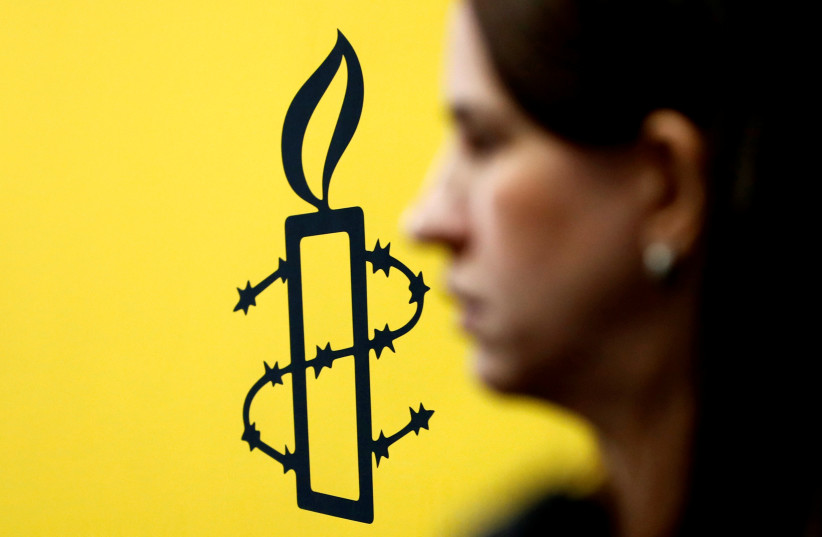On February 1, Amnesty International accused Israel of apartheid. However blatantly false the charge – as even noted by the head of Israel’s leading Islamist party – the allegation exposes more about Amnesty’s hypocrisy, incompetence, and anti-peace narrative than it does about reality in Israel.
Context is important. Though Amnesty claims its apartheid report “took four years” to complete, its timing is awfully suspect. The report emerged just a year after the latest peace deal under the Abraham Accords, and it begins with a discussion about events from 2021.
Amnesty does not support the accords and the peace and cooperation they have forged between Israel and its new Arab partners. While Amnesty has yet to applaud the accords’ achievements, one Amnesty publication has asserted that the “so-called normalization” efforts “cannot be understood as peace deals in the context of Israel and Palestine.”
Amnesty seemingly does not champion peace for Israel and its neighbors. It has likely cried apartheid in a desperate attempt to frustrate the momentum of the accords, which have only solidified Israel’s rightful place in the Middle East.
Only such a motive could explain Amnesty’s recent decision to label Israel as an apartheid state from its founding in 1948, targeting Israel’s very right to exist and priming Israeli officials for future demonization and prosecutions in the International Criminal Court.

However calculated its motives may have been, Amnesty’s efforts have backfired, sowing a spotlight under which it has seared. The results have been astonishing, ranging from a leading Amnesty director accidentally undermining his organization’s apartheid allegation, to democracies openly rejecting Amnesty’s findings (and even warning the group not fan the flames of antisemitism), to Amnesty reportedly demonstrating internalized racism and speech suppression.
The report’s high-profile controversy has provoked long overdue scrutiny of Amnesty’s fact-finding methods (and lack thereof). In an interview with The Times of Israel, Amnesty director Philip Luther admitted that Israel has, “such a complicated system, and it’s a dizzying array of laws, policies, and practices that interweave with each other. Now, any one component of those may mask the reality behind it, or may have what appears to be an innocent and legitimate aim.”
All other circumstances aside, the definition of apartheid requires intentional oppression from the perpetrator. Article 7(2)(h) of the Rome Statute describes apartheid as certain “inhumane acts” that are “committed in the context of an institutionalized regime of systematic oppression and domination by one racial group over any other racial group or groups and committed with the intention of maintaining that regime.”
Luther’s slip-up indicates that Amnesty’s allegations are hard-sought after and in bad faith. This reality is only compounded by Luther’s next hiccup – his confession regarding Amnesty’s failure to apply consistent human rights metrics.
Luther confessed that – other than Myanmar and Israel – Amnesty had investigated no other country for apartheid. He notes, “Under that lens of investigation, no. But there were discussions about where [else] we might start to do it.”
UNSURPRISINGLY, Amnesty’s credibility as an organization has since suffered in the democratic world. Six democracies with better human rights records than most governments around the world – Australia, Austria, Czechia, Germany, UK and US – have all outspokenly rejected Amnesty’s findings of apartheid.
Some have gone as far to express outrage at the organization’s underlying antisemitism. Czech Republic’s President Milos Zeman therefore exclaimed, “I am horrified by such an antisemitic stand and I completely condemn such a unilateral statement.”
Major editorial boards – The Wall Street Journal and New York Post – have also derided Amnesty’s report, reducing it to a libel and “smear.” These responses are compounded by the reality that no country has yet to openly embrace Amnesty’s report, which only suggest Amnesty’s flailing credibility and influence.
This high-profile controversy has further exposed Amnesty to attention under which it has allegedly resorted to incompetent and racist decision-making. Amnesty knows it can only advance its apartheid lie by falsely presenting Israel, the West Bank, and Gaza as one political unit, regardless of peace treaties willingly signed by both Israeli and Palestinian leaders.
The reality is that 20 percent of Israel’s population are Arabs, who enjoy equality under the law, affirmative action programs, and positions in Israel’s parliament and Supreme Court. An Arab Israeli judge, and later to be Supreme Court justice, even once sentenced an Israeli president (a Jew) to prison.
Israel is the furthest thing from an apartheid state; and while Amnesty blames Israel for Palestinian misfortune, nearly all Palestinians remain under the governance of the Palestinian Authority in the West Bank, or Hamas in Gaza.
So when activist Yoseph Haddad, an Arab citizen of Israel, was invited to debate an Amnesty panelist, Amnesty allegedly refused to participate, asking for a Jew instead. If true, the gesture could reflect what appears to be Amnesty’s racism, intellectual dishonesty, and will to stifle reality.
Questions concerning Amnesty’s xenophobia reinvigorate recent memories of Amnesty’s last racial controversy, which emerged less than a year ago when its UK office released an internal investigation in 2021.
Accounts of behavior included “senior staff using the N-word;” black staff members having their capabilities “questioned consistently and without justification,” and dismissive behavior targeting the religiously minded and those from the southern hemisphere.
The organization that had to apologize for its “systemic racism” now resurfaces for having previously refused to join a global call to fight antisemitism.
In sum, Amnesty’s apartheid allegations have provoked much negative exposure, setting in motion a sequence of self-defeating developments that have exposed the organization’s bad-faith motives, intellectual dishonesty, internal racism, and dwindling credibility.
Sadly, the human rights cause will bear the brunt of Amnesty’s impropriety; and as a world in which human rights abuses abound, we must demand better from our leading NGOs.
The writer is director of policy education for StandWithUs.
